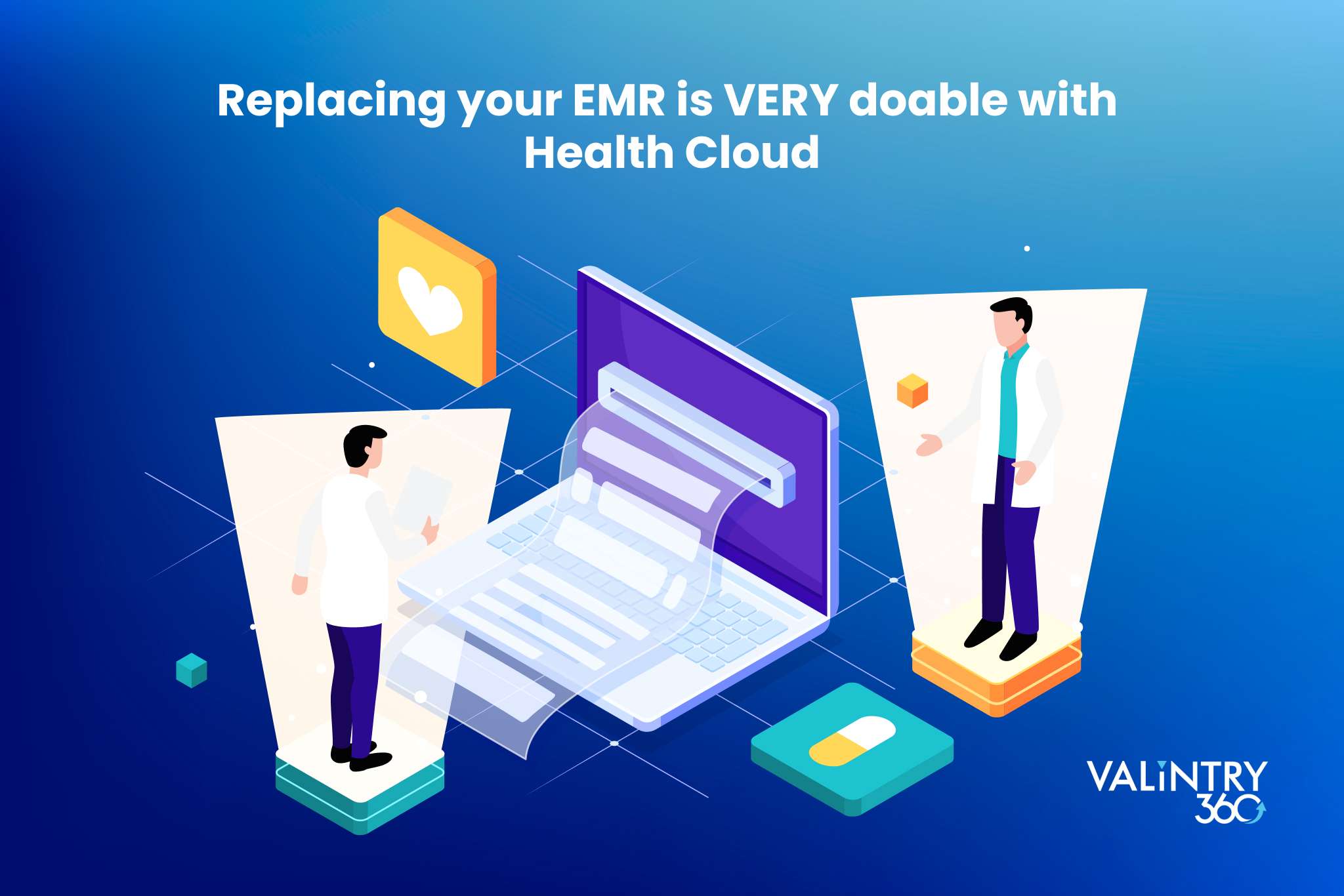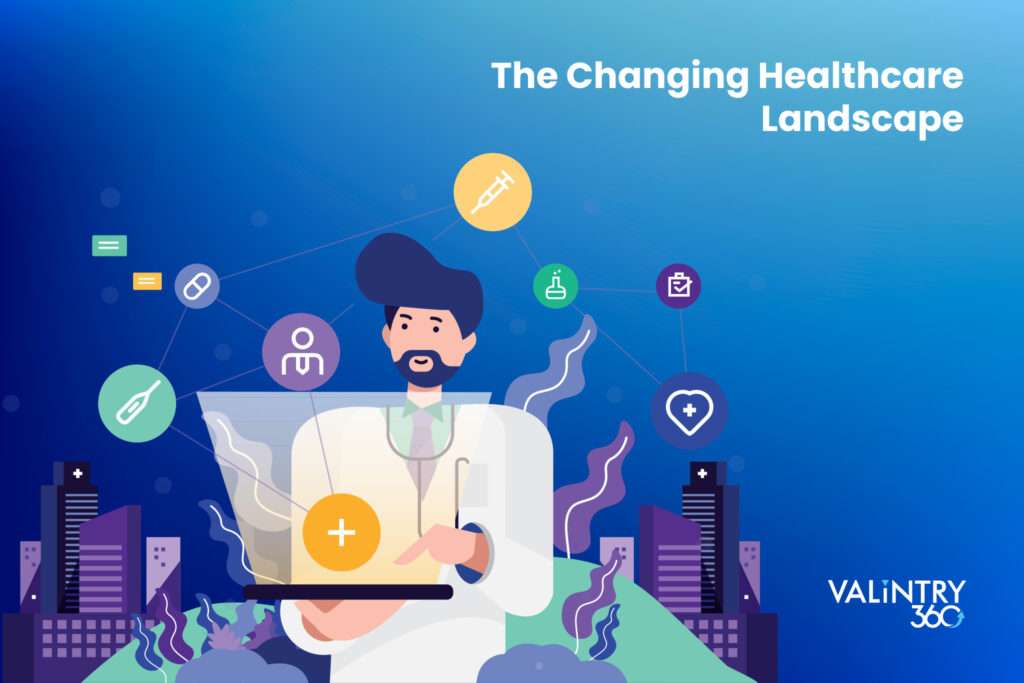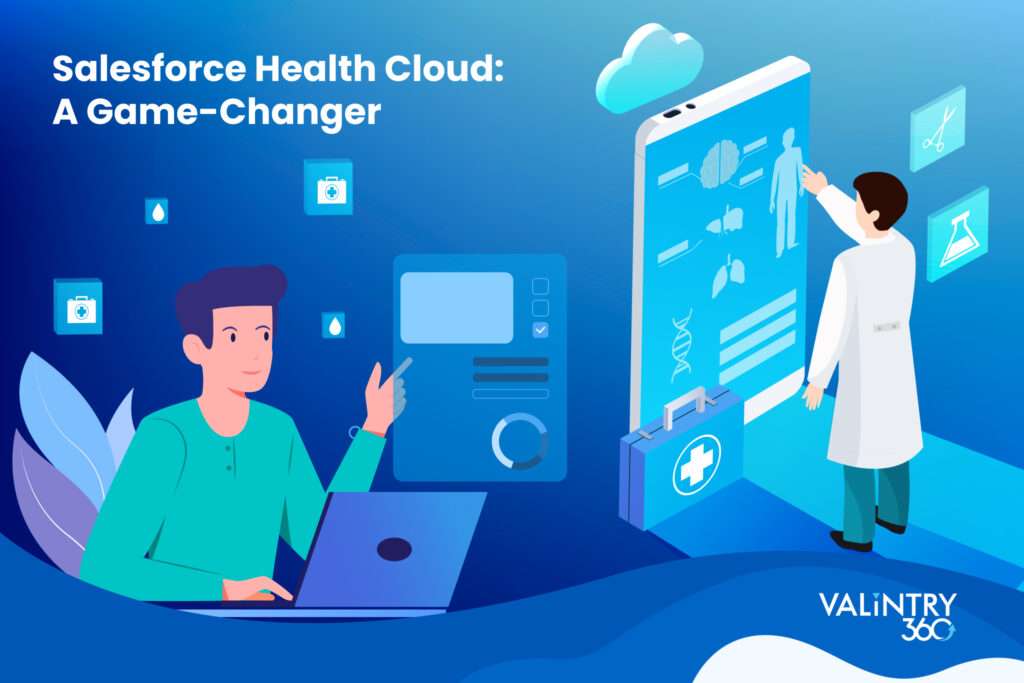
- Salesforce Health Cloud
Introduction
In today’s rapidly evolving healthcare landscape, managing patient data efficiently is paramount for providing high-quality care. The healthcare industry is witnessing a digital transformation, and staying ahead of the curve is essential. Electronic Medical Records (EMRs) have long served as the backbone of healthcare practices, aiding in patient data management and facilitating clinical workflows. However, as technology continues to advance, newer and more comprehensive solutions are emerging, redefining the way healthcare providers deliver care and manage their practices.
One such groundbreaking solution is Salesforce Health Cloud, a powerful platform designed to revolutionize the healthcare experience. With its advanced capabilities and seamless Salesforce Health Cloud integration, it offers healthcare providers an innovative approach to patient care and practice management. In this blog, we will explore the benefits of replacing traditional EMRs to Salesforce Health Cloud in a physician practice setting.
Our experts at VALiNTRY360 have successfully implemented this transformation, and we’re excited to share our insights with you. Join us as we explore how this transition can streamline your practice’s operations, enhance the quality of patient care, and ultimately improve overall practice management. Discover how Salesforce Health Cloud integration can be the key to unlocking a more efficient and patient-centric future for your healthcare practice.
Table of Content
The Changing Healthcare Landscape

The healthcare industry has witnessed significant digital transformation in recent years. Patient data is more abundant and complex than ever before, and the need for interoperability, data security, and seamless communication among healthcare providers is higher than ever.
As healthcare providers strive to deliver the highest quality care, they face new challenges related to interoperability, data security, and seamless communication among various stakeholders in the healthcare ecosystem.
One critical aspect of this evolving landscape is the surge in the volume and intricacy of patient data. Healthcare professionals now have access to an unprecedented wealth of information, encompassing medical histories, diagnostic results, treatment plans, and more. However, harnessing the full potential of this data to improve patient outcomes and streamline operations has become a formidable task.
Traditional Electronic Medical Records (EMRs) have played a pivotal role in healthcare, offering a reliable means of storing and managing patient records. Yet, in the face of these new industry dynamics, they often fall short in meeting the evolving demands of modern healthcare. The limitations of traditional EMRs have become increasingly apparent, highlighting the need for more advanced solutions.
Enter Salesforce Health Cloud, a game-changing platform that is revolutionizing healthcare management. Its array of features and functionalities addresses the challenges posed by the changing healthcare landscape. With Salesforce Health Cloud benefits, healthcare providers gain access to a comprehensive suite of tools that empower them to take patient management to the next level. The platform facilitates seamless communication, data security, and interoperability, all while enhancing the quality of patient care.
Salesforce Health Cloud: A Game-Changer

Salesforce Health Cloud is a powerful platform designed to address the unique needs of healthcare organizations. It leverages the capabilities of the Salesforce CRM (Customer Relationship Management) platform to provide a comprehensive solution for patient engagement, care coordination, and practice management. Here are some key benefits of replacing your EMR with Salesforce Health Cloud:
1. 360-Degree Patient View
Salesforce Health Cloud allows healthcare providers to consolidate patient data from multiple sources, creating a holistic view of each patient’s medical history, care plans, and social determinants of health. This comprehensive view enhances clinical decision-making and patient care.
2. Care Coordination
The platform facilitates better communication and collaboration among healthcare teams, including physicians, nurses, specialists, and care managers. It ensures that everyone involved in a patient’s care is on the same page, reducing errors and improving care outcomes.
3. Patient Engagement
Salesforce Health Cloud enables personalized patient engagement through tools like patient portals, texting and telehealth integrations. Patients can access their records, schedule appointments, receive enrollment materials, appointment reminders and communicate with their providers easily, leading to improved patient satisfaction and adherence to treatment plans.
4. Analytics and Reporting
Advanced analytics and reporting capabilities help practices identify trends, monitor patient outcomes, and optimize operations. This data-driven approach can lead to more informed decisions and better resource allocation.
5. Scalability
Salesforce Health Cloud is highly scalable and can adapt to the changing needs of your practice. Whether you’re a small family practice or a multi-practice setting, the platform can grow with you.
6. Security and Compliance
Data security is a top priority in healthcare. Salesforce Health Cloud complies with industry standards like HIPAA, ensuring that patient data remains secure and confidential
7. Customization
The platform is highly customizable, allowing you to tailor it to your practice’s specific workflows and requirements. You can create custom fields, workflows, and automation to streamline operations.
Implementation Considerations
While the benefits of transitioning to Salesforce Health Cloud are clear, it’s important to consider the following when planning the implementation:
- Business Process Definition: Well-defined business processes are crucial for the successful implementation of Salesforce Health Cloud. These processes ensure that patient data is accurately collected, securely managed, and efficiently utilized, enabling healthcare providers to deliver personalized care, streamline operations, and maintain compliance with healthcare regulations.
- Data Migration: Migrating data from your existing EMR to Salesforce Health Cloud can be complex. It’s crucial to plan this process carefully to ensure data integrity and continuity of care.
- Training and Adoption: Training your staff to use the new platform effectively is essential. Invest in comprehensive training programs to ensure a smooth transition
- Integration: Ensure that Salesforce Health Cloud integrates seamlessly with other systems you use, such as billing software, lab systems, and pharmacy systems
- Change Management: Change can be challenging for both staff and patients. Implement a robust change management plan to ease the transition and address any concerns.
Conclusion
As healthcare continues to evolve, leveraging advanced technology is essential to stay competitive and provide high-quality care. Replacing your EMR with Salesforce Health Cloud in a physician practice can significantly enhance patient care, streamline operations, and improve practice management.
While the transition may require careful planning and resources, the long-term benefits are well worth the investment. Embrace the future of healthcare with Salesforce Health Cloud and lead your practice toward a more efficient and patient-centric model of care.
Related Posts
- Salesforce Health Cloud
Salesforce Health Cloud vs. Traditional Healthcare IT: Which…
In the evolving realm of healthcare technology, Salesforce Health Cloud and traditional healthcare IT systems are at the forefront of debate among industry experts. Traditional IT systems have long provided stability and familiarity in managing patient records, scheduling, and billing…
- Salesforce Health Cloud
Optimizing Workflow Efficiency with Salesforce Health Cloud
Inefficiencies in healthcare practices, such as fragmented workflows, redundant tasks, and poor communication, impact patient care and increase costs. Addressing these issues requires integrated systems to streamline operations, reduce redundancies, and improve communication. Additionally, staff training and standardized processes promote…
- Salesforce Health Cloud
Salesforce Health Cloud: How to Improve Patient Engagement…
In a rapidly evolving healthcare landscape, patient engagement and outcomes are critical priorities for providers committed to delivering exceptional care. Salesforce Health Cloud emerges as a transformative solution designed to enhance these priorities through advanced technologies and patient-centric approaches. From…

